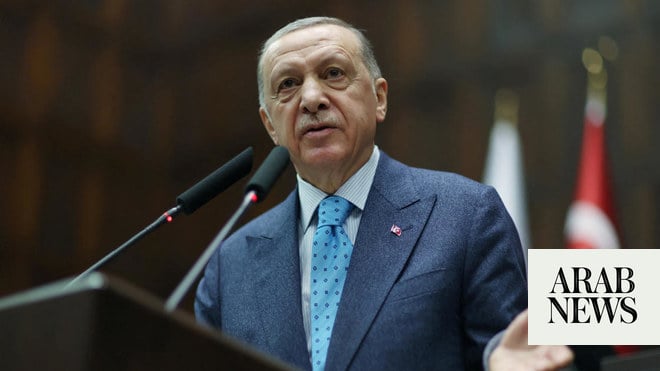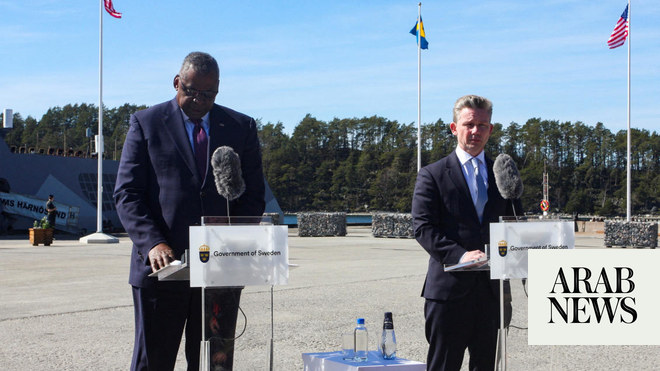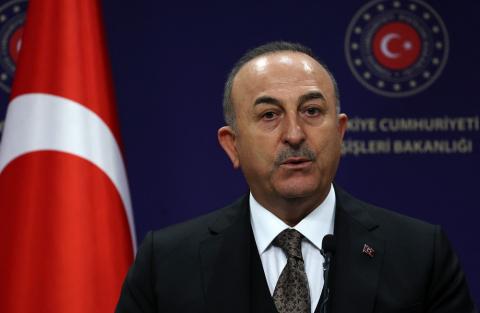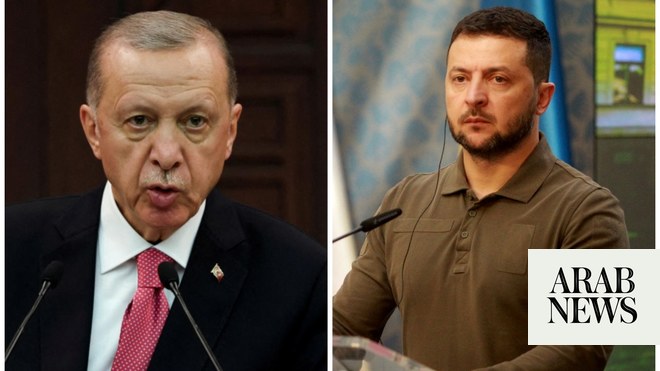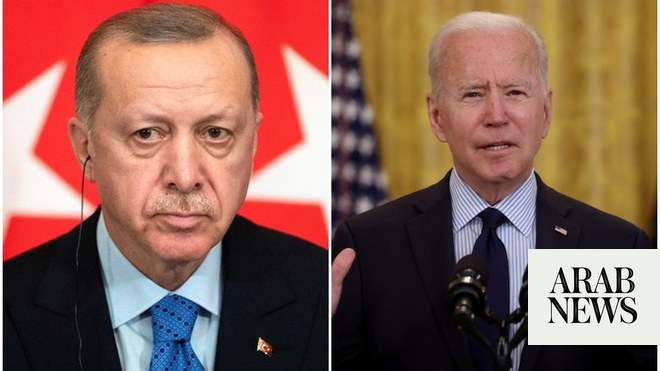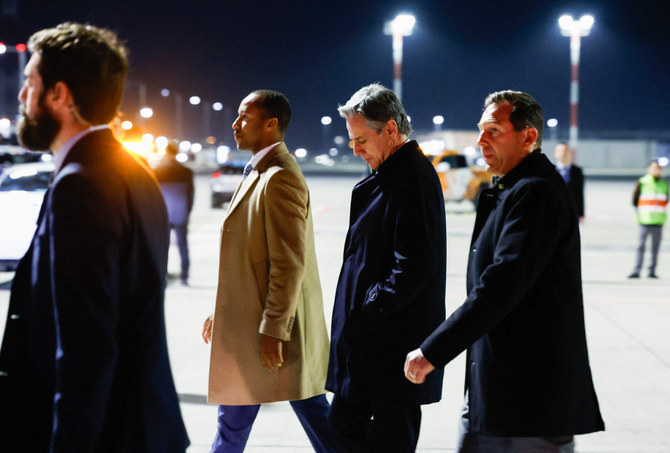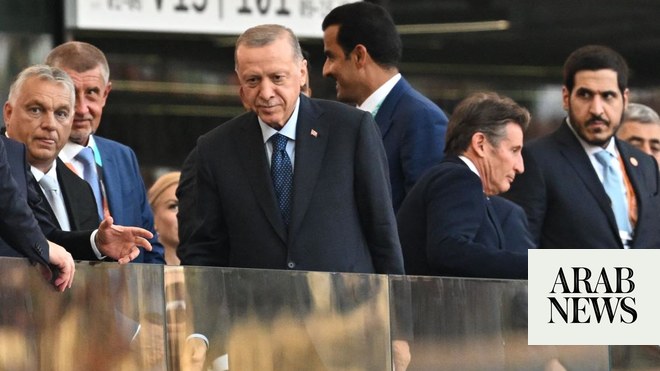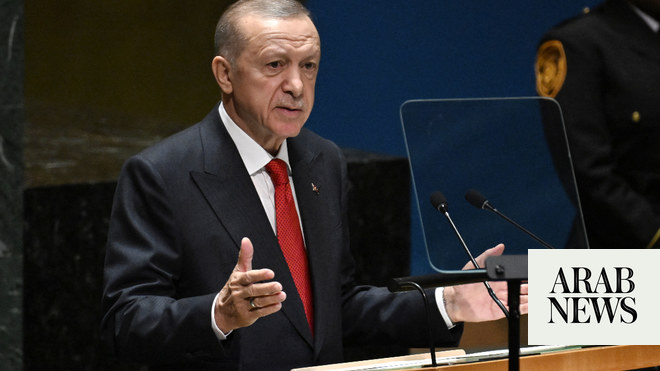
Sweden must deal with ‘terrorists’ on its streets, says Turkiye leader
Ankara hopes to break deadlock with US on purchase of F-16 fighter jets
ANKARA: Turkiye’s President Recep Tayyip Erdogan has reaffirmed his administration’s expectations of Sweden regarding NATO membership approval, which includes the latter nation dealing with “terrorists” — a seeming reference to the country allowing protests by the outlawed Kurdistan Workers’ Party.
Turkiye’s perceived reluctance to ratify Sweden’s NATO accession has seen the country deadlocked with the US over a deal to acquire a fleet of new F-16 fighter jets.
During a recent exclusive interview with the US broadcaster PBS in New York, Erdogan said: “We have repeatedly stated that we were ready to support Sweden’s bid to join NATO, but Sweden is supposed to rise up to the occasion and keep their promises, because, on the streets of Stockholm, we still see terrorists wandering around freely.”
The discussion also touched on Turkiye’s diplomatic relationships, including its ties with Russia and Western nations, and addressed key issues such as NATO enlargement and the F-16 deal.
Sweden’s bid to join NATO will be assessed by the Turkish Grand National Assembly for final ratification when parliament — where Erdogan’s ruling party and its allies hold a majority — returns from recess at the beginning of October.
“This is a part of the agenda of the Turkish Grand National Assembly,” Erdogan said. “The assembly will see the situation within the framework of its own calendar.”
But Erdogan has yet to submit the Swedish accession protocol to parliament, and the ratification process is not expected to proceed quickly once the house convenes.
Sweden could also be asked to provide Turkish officials with a roadmap — as agreed in the July NATO summit — to specify its counterterrorism efforts.
“While Sweden has carried out legislative amendments, we believe that more action is needed,” Erdogan added.
According to Hakan Akbas, founder of Strategic Advisory Services, a political consulting firm based in Istanbul and Washington, there is a trust deficit in US-Turkiye relations.
“Erdogan’s foreign policy of friends-with-benefits is in play also with Sweden’s accession to NATO in return for the $20 billion sale of F-16s to Ankara. A back-channel deal has been made pending the ratification by the Turkish parliament in early October,” he told Arab News.
Several experts also underline that the absence of an invitation from the White House to the Turkiye leader increases the feeling of distrust among Ankara’s policymakers, while any further move to delay Sweden’s membership ratification is expected to infuriate the US which attaches great importance to NATO’s expansion.
Akbas expects the Joe Biden administration to write to the Senate about the sale, and US National Security Adviser Jack Sullivan will need to make sure there is no veto this time.
“As the Ukraine-Russia war goes on with no end in sight, Sweden’s NATO membership is more critical than ever. On the other hand, there are US presidential elections next year. Erdogan knows how important this accession is to the US and Sweden. He appears to attempt squeezing more last-minute concessions from Sweden until the parliamentary approval,” he said.
Turkiye has long requested the jets, especially after it was removed from the F-35 warplane program in 2019 over its purchase of Russia’s S-400 air defense system. But the sale of 40 new F-16s as well as kits to upgrade the jets have faced opposition from US lawmakers, and turned it into a bargaining chip.
In July, Sullivan said the Biden administration intends to move ahead with the sale to Turkiye in consultation with Congress, but rejected suggestions that Turkiye’s lifting of its opposition to Sweden’s NATO accession was linked to the deal.
While Secretary of State Antony Blinken has reportedly been having talks with US lawmakers regarding the potential sale, some are still skeptical and want Sweden’s accession bid ratified.
For Paul T. Levin, director of Stockholm University’s Institute for Turkish Studies, Erdogan’s primary objective is to secure the F-16 deal.
“For that purpose, he wants to maintain his leverage until that deal is sealed, using the claim that the Turkish parliament might still reject it as a bargaining tactic,” he told Arab News.
“In terms of what was actually agreed in NATO’s Vilnius Summit, he promised not just to submit the ratification to the Grand National Assembly for ratification, but also to work closely with the assembly to ensure ratification. However, that promise does not seem to be worth much at the moment,” Levin added.
Levin said that even if an agreement is reached with the US Congress to proceed with the F-16 deal, pro-PKK — the outlawed Kurdistan Workers’ Party — demonstrations and Qur’an burnings in Sweden could still pose challenges to ratification.
He pointed out that Swedish law limits what the authorities can do to prevent such actions, despite ongoing investigations into Qur’an burners for hate crimes.
To alleviate Turkiye’s security concerns, NATO also committed to increasing its efforts in counter-terrorism cooperation by establishing a special coordinator.
In the PBS interview, Erdogan alluded to his close ties with Vladimir Putin’s Russia, by saying: “To the extent the West is reliable, Russia is equally reliable. For the last 50 years, we have been waiting at the doorstep of the EU and, at this moment in time, I trust Russia just as much as I trust the West.”
Before heading to New York, Erdogan also suggested Turkiye could end its EU membership bid.
According to Levin, the PBS interview made clear that Erdogan’s Turkiye is not a natural member of the Western alliance.
“He trusts Putin and Russia just as much as he does the West. His Turkiye wants to be an independent power, not a subservient ally. The hopes that Turkiye would turn toward the West in any meaningful way after the elections are naive,” he said.
Levin said he believes that Erdogan’s repeated references to Turkiye’s decades-long wait at Europe’s door might reflect psychological motivations for obstructing Sweden’s NATO accession.
“There is a sense of hurt pride and satisfaction of now being able to turn the tables and give Europe — with Sweden as the stand-in for the continent — the medicine it long dished out to Turkiye. That is understandable but also unfair since Sweden actually was a strong supporter of Turkiye’s EU accession,” he said.




